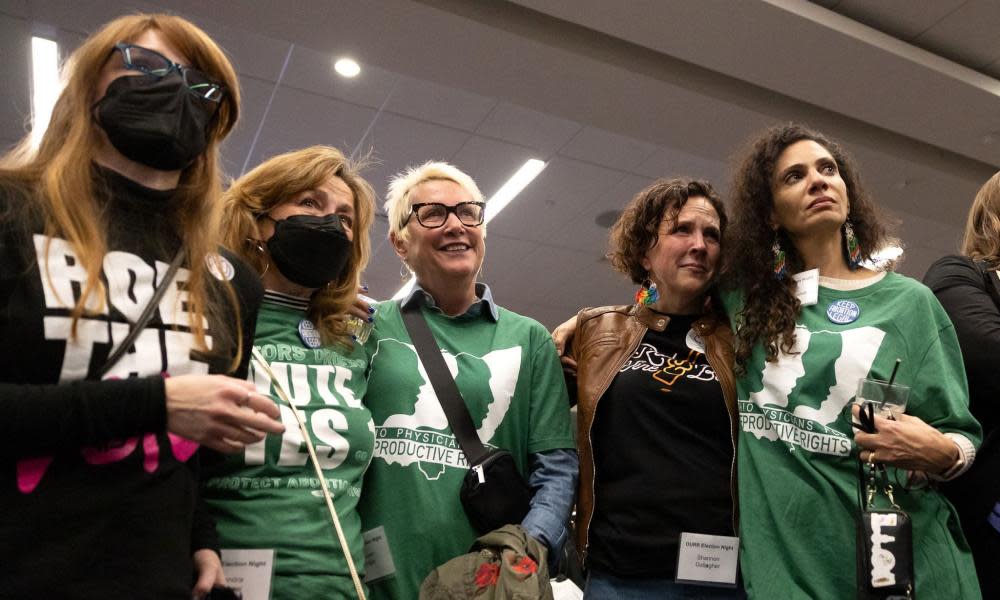Democrats hope to emulate Ohio ballot-measure plan to protect abortion rights

In the days since Ohio voters overwhelmingly backed a ballot measure to enshrine abortion access in the state constitution, abortion rights supporters and Democrats across the country have become enthralled with the idea of using such measures to protect access to the procedure.
Not only are ballot measures often the best chance states have of restoring or protecting abortion rights, but they have proved to be a shot in the arm for Democratic and Republican voters alike. Ballot measures in states such as Kansas and Ohio, once considered conservative strongholds, have won by overwhelming margins – and won in areas that Joe Biden lost in 2020.
Abortion-related referendums are already under way in swing states such as Arizona, Nevada and Florida. However, despite the post election-day enthusiasm, these measures are far from a failsafe.
Related: Republicans beware: hostility to abortion stands to haunt Trump’s party in 2024 | Lloyd Green
“They are an important tool. But they require a lot of preparation and work,” said Deirdre Schifeling, chief political and advocacy officer at the American Civil Liberties Union. Although the national ACLU is still deciding where to direct its firepower, the organization’s state affiliates are involved with several ballot-measure efforts.
“Is there a very strong and united in-state coalition? Is there a commitment from funders that they’re really ready to do this?” Schifeling said.
In many states, abortion rights supporters still have several months to gather enough signatures to secure a spot on the ballot. In purple Arizona, abortion-rights activists are eager to garner the votes of independents and Republicans. They are pitching their measure as a rebuke to government overreach, just as activists did in Kansas and Ohio.
“It may be, in the narrowest sense, possible to win with only Democrats. But that’s not even on our radar,” said Jodi Liggett, senior adviser for Reproductive Freedom for All Arizona, which is championing an abortion ballot measure. “We can trust Arizonans to make good decisions, and they want to restore their freedom to access abortion without government interference.”
However, in some states, ballot-measure organizers are already running into interference from state officials.
In Missouri, which bans almost all abortions, two groups have proposed separate sets of ballot amendments. One set of amendments would overturn Missouri’s abortion ban by enshrining reproductive rights writ large into the state constitution. The other would add a number of exceptions into the state’s existing abortion ban, including for rape and incest, as well as potentially legalize abortion in the first 12 weeks of pregnancy. (As each group submitted a number of proposals, the language varies from proposal to proposal.)
But both groups have ended up in court over the amendments, arguing that Missouri’s secretary of state, John Ashcroft – who is in charge of writing summaries of the ballot initiatives that will appear in front of voters – wants to rewrite the initiatives with misleading language. For example, Ashcroft suggested telling voters that one amendment would “nullify Missouri laws protecting the right to life”.
Meanwhile, Florida’s attorney general, Ashley Moody, has asked that state’s court to keep a proposed initiative to protect abortion rights off the ballot. The initiative is “part of a similar overall design to lay ticking timebombs that will enable abortion proponents later to argue that the amendment has a much broader meaning than voters would ever have thought”, Moody argued in a late October filing.
The ballot initiative, should it end up in front of voters, would protect abortion until fetal viability – a benchmark that generally occurs around 24 weeks of pregnancy. Florida currently bans abortion past 15 weeks of pregnancy, but the state supreme court is now weighing a lawsuit over that ban. If the state supreme court upholds it, then a six-week ban would be cleared to take effect.
“You can have situations where a state court or state legislature will find reasons to throw out your ballot language because you put a comma in the wrong place, or they decide the definition of a word needs to be something else,” Schifeling said. “They’ll use whatever they can use to, to disqualify a ballot initiative.”
